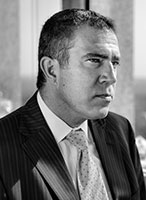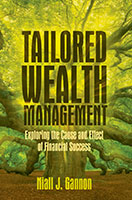
by Niall J. Gannon, Author of Tailored Wealth Management
Niall J. Gannon, Tailored Wealth Management: Exploring the Cause and Effect of Financial Success,published 2019 by Palgrave Macmillan and reproduced with permission of SNCSC
There are several categories into which financial advisors fall. We shall address the pros and cons of each:
The In-Sourced or Outsourced CIO Model: An in-sourced CIO is one that you hire who has full discretion to make financial decisions on your behalf. The professional might be a family office executive to whom you pay a salary (in-sourced) OR she might be the managing director of a boutique money management firm (outsourced) that caters to a handful of families like yours. A family office executive might be a seasoned investment professional in whom you have a high level of trust and confidence to make portfolio and asset allocation decisions on your behalf. If you look at some of the successful college endowment portfolios, you will see that they employ the in-sourced CIO model where a seasoned professional oversees a team of strategists and portfolio managers to implement their mandate to beat or achieve the organization’s investment goals.
As a wealthy family, you may hire a boutique investment firm that operates not as an investment consultant, but one who is given discretion to make direct investment decisions on your behalf. I would like to see more firms adopt this model, as I believe that when operated effectively they can control fees, provide an understanding of the assets owned by the family, offer a sharp focus and concentration, and won’t fall victim to over-diversification or mediocrity. If you are wondering whether an advisor might be considered for the position of outsourced CIO, ask this handful of questions at the inception of the relationship:
- What percentage of your firm’s assets will my family represent?
- How many families does your firm represent and is there a limit to how
many you will represent before closing to new relationships?
- Does your firm claim compliance with the Global Investment Performance
Standards, and is there an outside audit that verifies your performance
record?
- Does your fee schedule change from client to client or do you offer your
most competitive fee arrangement to all relationships?
- Will my investment decisions be outsourced to other firms, ETFs, mutual
funds, or are all investment decisions implemented internally?
- Are your investment results reported gross or net of taxes?
- To continue my due diligence, may I have several references from people
who are in similar financial situations to mine (people whose contact information
the advisor is willing to share)?
The Private Wealth Advisor: A second model of private wealth advisor is the investment consultant. This model mirrors (in many ways) the institutional model of endowments and private foundations. An investment consultant, unlike the outsourced CIO, will act as a quarterback. You will pay a fee to the consultant based upon assets under management for asset allocation advice, manager selection, and portfolio monitoring. With an investment consultant model, money management decisions are delegated to other money managers, ETFs, mutual funds, and private investments. The consultant can be found in large private wealth trust companies, the major Wall Street Private Wealth Management firms, and some consulting firms that serve both private investors and institutional clients.
For families with over $100 million under management, the fee paid to the investment consultant will likely be smaller than the cumulative fees of the outsourced money managers. Those who favor this model like the fact that the investment consultant can recommend that you deploy capital virtually anywhere. Their job is to search for funds and investment managers who fit the required asset allocation sleeve, monitor their progress, and make recommendations going forward.
Some investors find that a consultant-advised portfolio is so broadly diversified by asset class, manager, and securities that it becomes difficult to decipher that which will ultimately build or destroy capital in the portfolio. That is, if the performance of a portfolio is a function of the success of the individual investments it contains, an investor or their consultant might not be able to address questions about individual securities or the risks they contain. When the sun is shining on a bull market, questions about the thickness of the castle walls in a portfolio are less common than when markets are succumbing to major corrections or crashes.
It is difficult for a consultant to offer a prospective new client a comprehensive audited performance track record. In their defense, institutional and private wealth clients may have very different asset allocations and a widely varied team of outside money managers. However, consultants will often provide prospective clients with a “representative list” of clients that might offer insight into their particular asset allocations and performance data. These performance numbers may not be indicative of what the new client portfolio will look like, but it can provide the basis for an intelligent discussion about changes and inflection points over the history of the account. It is also common for the representative client list to include references the prospective client may contact.
Additional Skills to Look for in a Financial Advisor
An effective financial advisor must display skills and experience that go beyond investing and monitoring the family’s financial capital. He or she must understand the nuances of the family’s estate plan. It is also critical for them to understand the philanthropic intent and social capital of the family. In short, the family should be certain that when the death of the wealth creator occurs, the beneficiaries will feel confident that their advisor will take a holistic and comprehensive view of the task ahead. Ideally, the advisor will benefit from the cumulative experience gained by having worked with the family for decades.
About the Author:

Niall J. Gannon is a Private Wealth Advisor to ultra-high-net-worth investors and lead member of the Gannon Group. He has been recognized as one of the nation’s top 100 Financial Advisors by Barron’s and Registered Rep. He is the author of Tailored Wealth Management: Exploring the Cause and Effect of Financial Success
(Palgrave Macmillan; 2019) and Investing Strategies for the High Net-Worth Investor: Maximize Returns on Taxable Portfolios (McGraw-Hill, 2009). In 2018 he published The Efficient Valuation Hypothesis in Seeking Alpha.
Niall has appeared on CNBC & National Public Radio and been quoted in the New York Times, Wall Street Journal, and Barron’s. His research has been featured or quoted in ten books and academic articles by other authors. Niall has addressed the CFA Institute, Institute for Private Investors, Portfolio Management Institute, Family Office Exchange and Tiger 21.

Niall is affiliated through various roles with the Institute for Private Investors, CFA® Institute Committee for Investment Policy, The Papal Foundation, Roman Catholic Foundation, and Cor Jesu Academy. He co-founded the Rev. James Kisero Children’s clinic in the village of Bolo, Kenya. He is a past board member of Junior Achievement, Connections to Success, St. Louis Variety, St. Louis Irish Arts and the Annual Catholic Appeal.
Niall received the Silver Congressional Award, President’s Volunteer Service Award, alumnus of the year at The Citadel School of Business, PMI Portfolio Manager of the Year Award, and is a member of The Order of St. Louis the King. He is a graduate of The Citadel and served in the US Army Reserve as an M1-Abrams tank platoon commander.




